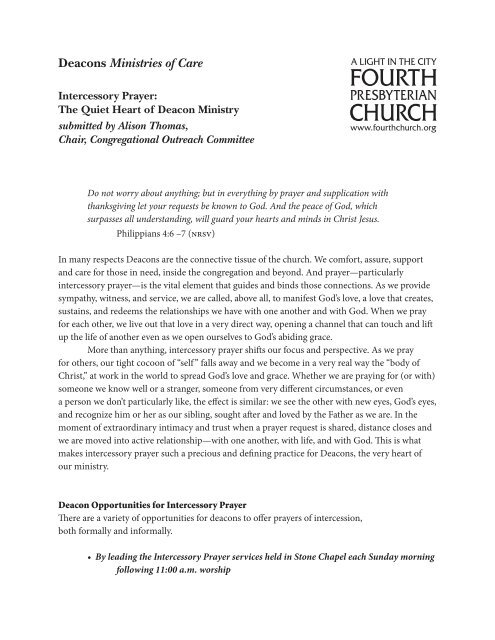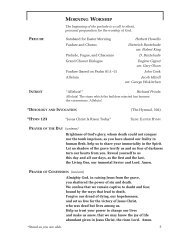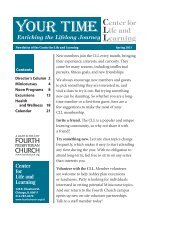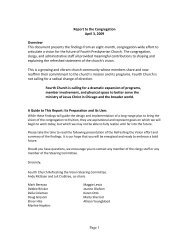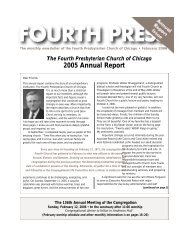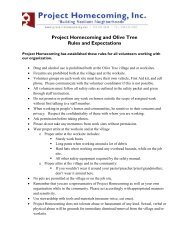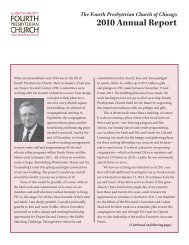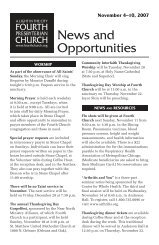Intercessory Prayer - Fourth Presbyterian Church
Intercessory Prayer - Fourth Presbyterian Church
Intercessory Prayer - Fourth Presbyterian Church
Create successful ePaper yourself
Turn your PDF publications into a flip-book with our unique Google optimized e-Paper software.
Deacons Ministries of Care<br />
<strong>Intercessory</strong> <strong>Prayer</strong>:<br />
The Quiet Heart of Deacon Ministry<br />
submitted by Alison Thomas,<br />
Chair, Congregational Outreach Committee<br />
Do not worry about anything; but in everything by prayer and supplication with<br />
thanksgiving let your requests be known to God. And the peace of God, which<br />
surpasses all understanding, will guard your hearts and minds in Christ Jesus.<br />
Philippians 4:6 –7 (nrsv)<br />
In many respects Deacons are the connective tissue of the church. We comfort, assure, support<br />
and care for those in need, inside the congregation and beyond. And prayer—particularly<br />
intercessory prayer—is the vital element that guides and binds those connections. As we provide<br />
sympathy, witness, and service, we are called, above all, to manifest God’s love, a love that creates,<br />
sustains, and redeems the relationships we have with one another and with God. When we pray<br />
for each other, we live out that love in a very direct way, opening a channel that can touch and lift<br />
up the life of another even as we open ourselves to God’s abiding grace.<br />
More than anything, intercessory prayer shift s our focus and perspective. As we pray<br />
for others, our tight cocoon of “self ” falls away and we become in a very real way the “body of<br />
Christ,” at work in the world to spread God’s love and grace. Whether we are praying for (or with)<br />
someone we know well or a stranger, someone from very diff erent circumstances, or even<br />
a person we don’t particularly like, the eff ect is similar: we see the other with new eyes, God’s eyes,<br />
and recognize him or her as our sibling, sought aft er and loved by the Father as we are. In the<br />
moment of extraordinary intimacy and trust when a prayer request is shared, distance closes and<br />
we are moved into active relationship—with one another, with life, and with God. Th is is what<br />
makes intercessory prayer such a precious and defi ning practice for Deacons, the very heart of<br />
our ministry.<br />
Deacon Opportunities for <strong>Intercessory</strong> <strong>Prayer</strong><br />
Th ere are a variety of opportunities for deacons to off er prayers of intercession,<br />
both formally and informally.<br />
• By leading the <strong>Intercessory</strong> <strong>Prayer</strong> services held in Stone Chapel each Sunday morning<br />
following 11:00 a.m. worship
Th is core Deacon responsibility, one of our weekly volunteer opportunities (DVOs),<br />
involves praying for both those who come in person to the chapel and those who submit<br />
written requests in one of the four prayer boxes. A duty description provides full<br />
instructions for this service (found at the end of this document).<br />
• By joining in the intercessions (and petitions) off ered as part of each Deacon meeting.<br />
Typically there are opportunities to off er up such prayers both corporately, with<br />
the full group, and personally, with a Deacon on duty to receive special prayers.<br />
• By encouraging prayer requests during Network Calling and, in some cases,<br />
joining in immediate prayer with those contacted.<br />
As many of us have found, the calls that do get personally answered (vs. going to<br />
voicemail) are oft en the ones where there’s a real need—and, in that moment, there’s<br />
a chance to make a prayerful connection, even as information is gathered for passing<br />
along to the staff for Morning <strong>Prayer</strong>.<br />
• By inviting prayer requests at suppers and other community outreach programs.<br />
Deacons on duty at the Monday, Sunday, and <strong>Fourth</strong> Friday Night Suppers and at other<br />
outreach activities, such as picnics at the Community Garden, invite guests to submit<br />
written requests, using the standard form, or to pray one-on-one in a quiet place, off to<br />
the side. Written requests are distributed among Deacons on duty at the event, who off er<br />
up those prayers over the ensuing week and then forward them to Ali Trowbridge,<br />
Associate Pastor for Congregational Care.<br />
• By spreading the practice to other committees and fellowship groups . . . and beyond.<br />
Deacons can help to create a richer prayer culture throughout the church by sharing the<br />
practice of intercessory prayer, through both leadership and training, with other groups.<br />
• By including in your personal prayers.<br />
Some Thoughts on Becoming More Comfortable with <strong>Intercessory</strong> <strong>Prayer</strong><br />
• Do some preparation. Read and think about the practice. Tap into your own prayer life;<br />
if you have a prayer that is familiar and personally resonant, use it as your “go-to” resource<br />
for starting (or concluding) an intercession. Work from a standard framework, such as:<br />
Opening prayer, oft en of praise and thanksgiving.<br />
Lift ing up of prayer request(s).<br />
Silent prayer.<br />
Closing prayer, such as the Lord’s <strong>Prayer</strong> said in unison.
• Take a moment to quiet and calm yourself before starting. Off er up your own petition<br />
for peace and presence.<br />
• Focus on and think about the request(s). Open up your senses. Listen or read for the<br />
real concerns and feelings of the person making the request. Let go of any preconceptions<br />
and welcome in the Holy Spirit.<br />
• Be yourself. Don’t worry about pauses or hesitations or using “perfect” words. Th is is<br />
not a performance, but a moment of intimacy and personal connection.<br />
• Practice the practice.<br />
– Hold in your heart the prayers shared in an intercession, whether at the prayer<br />
service on Sunday morning or during a Deacon meeting. Return to them over the<br />
ensuing week.<br />
– Pray your own “naturally-occurring” intercessions as an expression of love and<br />
care for the people, groups, and situations close to you, in your own life.<br />
– Take advantage of opportunities to pray “publicly” as a Deacon:<br />
Say grace at Sunday Night Supper.<br />
Sign up for <strong>Intercessory</strong> <strong>Prayer</strong> duty or back-up another Deacon.<br />
– Ask another Deacon to join you in conducting <strong>Intercessory</strong> <strong>Prayer</strong>.<br />
– Participate in partner prayers and similar practices at Board of Deacon<br />
meetings and extend them to your home life and/or other groups<br />
with which you’re involved.<br />
– Share in the Deacon <strong>Prayer</strong> Book, available for contributions at each meeting.
The Deacon Duty of Leading Weekly <strong>Intercessory</strong> <strong>Prayer</strong> Service<br />
Th e Deacons lead <strong>Intercessory</strong> <strong>Prayer</strong> services in John Timothy Stone chapel following the<br />
11:00 a.m. worship service each Sunday morning. Visitors and members of <strong>Fourth</strong> <strong>Presbyterian</strong><br />
<strong>Church</strong> are encouraged to participate either by joining the Deacon prayer leader in Stone Chapel<br />
or by fi lling out a prayer request form and dropping it in one of the designated boxes. Box<br />
locations are at the entrance to Stone Chapel, on the Volunteer table during Coff ee Hour, in the<br />
Narthex, and with the receptionist. Request forms can be found in the church literature racks, at<br />
the Welcome Table, and alongside the boxes outside Stone Chapel, on the Volunteer table during<br />
Coff ee Hour, and in the Narthex.<br />
Deacon responsibilities for this activity are as follows:<br />
• Check all four prayer boxes (Narthex, Receptionist, Volunteer table, and Stone Chapel)<br />
for requests and arrive at Stone Chapel before the end of 11:00 worship. Plan to stay until<br />
at least 12:45 p.m. (most prayer seekers arrive between 12:20 and 12:40 p.m.).<br />
• Partially close the doors to increase privacy while still encouraging entry of late arrivers.<br />
Be aware that you may continue to get traffi c through the chapel from the choir loft and<br />
back doorway. Position yourself toward the front of the chapel and signal “Quiet” to<br />
anyone straying in.<br />
NOTE: On Communion Sundays, Stone Chapel is used to stage the communion elements<br />
for each of the services. Work around the set-up table–try drawing some chairs into a<br />
circle for the prayer.<br />
• Greet anyone wishing to participate. Welcome them in, introduce yourself, and invite<br />
them to share a bit about themselves and their prayer request(s). Probe gently to be sure<br />
you have the information you need to make your prayer focused and personally<br />
meaningful for the attendee.<br />
– Let go of any assumptions, anxiety, or “agenda.”<br />
– Listen attentively for the concerns and feelings of the person with you and<br />
for the Spirit.<br />
– Explain the process and ask whether attendee(s) would like to off er the prayer<br />
in their own words or would prefer for you to say the prayer(s).<br />
– If there are multiple attendees, you may want to check whether they want to<br />
pray together or would rather do it individually.
• A common order for this type of prayer service is:<br />
Opening prayer, oft en of praise and thanksgiving.<br />
Lift ing up of prayer request(s).<br />
Silent prayer.<br />
Closing prayer, for example, the Lord’s <strong>Prayer</strong> said in unison.<br />
• <strong>Prayer</strong> leaders are encouraged to draw from their own prayer resources and experiences.<br />
Th ey can also use the prayer booklet distributed to Deacons, a copy of which is kept in<br />
the piano bench in Stone Chapel.<br />
• Should someone appear to be in distress and in need of special attention or intervention<br />
by the church staff , locate the minister in charge (MIC)—who is usually available in<br />
Coff ee Hour—or any of the pastors.<br />
• Aft er prayers, place the written prayer requests in one of the envelopes addressed to<br />
Ali Trowbridge’s attention (kept with the request box at the Volunteer table) and give to<br />
the receptionist.


